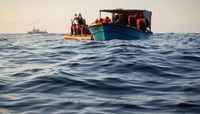Tragedy struck the southern coast of Lesbos, Greece, on Tuesday, October 7, 2025, when a boat carrying migrants sank in the early hours, resulting in the deaths of four people, including a child. The incident, which unfolded off the rocky shores of this eastern Aegean island, has once again cast a harsh spotlight on the perilous journeys undertaken by migrants and refugees seeking safety and a better life in Europe.
According to the Greek coast guard, patrol crews recovered the bodies of two women, a man, and a young girl from the sea near a rugged stretch of the island’s southern coastline. A semi-submerged boat was discovered close to the shore, evidence of the vessel’s final, desperate moments. The coast guard’s swift response, while crucial, could not prevent the loss of life. Thirty-four survivors managed to reach the shore on their own, where they were found by police, shaken but alive.
Authorities immediately launched a search and rescue operation, deploying both vessels and helicopters to scour the area for other possible survivors. However, after speaking with those who made it to land, officials confirmed that there had been a total of 38 people on board the ill-fated boat. With this information, the search was called off, as survivors insisted there were no further missing persons.
No details have yet been released regarding the nationalities of either the victims or the survivors. While officials continue to investigate the cause of the sinking, there has been no immediate clarity on what led the boat to capsize just meters from the Greek shoreline. The only certainty is the tragic outcome for the four who lost their lives and the trauma endured by those who survived.
The Associated Press reported that the boat was found semi-submerged near a rocky part of the shore, and the survivors were discovered by police after making their way to land unaided. A spokesperson for the coast guard stated, “A coast guard patrol boat recovered the bodies of two women, a man, and a girl from the sea on the southern coast of the island of Lesbos.”
Most of the survivors are believed to be from Africa, according to news agencies cited by Pakistani outlets. However, Greece has yet to officially confirm the identities or national backgrounds of those involved. The uncertainty only adds to the anguish of families and communities waiting for word of their loved ones.
This latest incident is far from isolated. In recent months, several similar tragedies have occurred in the waters between Turkey and Greece, resulting in hundreds of deaths. Many of the victims have been from Pakistan, as well as other countries across Africa and Asia. The route, though short in distance, is fraught with danger, especially for those traveling in overcrowded or unseaworthy vessels.
Lesbos, like other Greek islands in the eastern Aegean, has become a primary gateway into the European Union for migrants fleeing war, persecution, and grinding poverty in the Middle East, Africa, and Asia. The journey from the Turkish coast to Greek shores is often made in inflatable dinghies or small boats ill-equipped to handle the open sea. Fatal sinkings have become a grimly common occurrence, despite increased patrols and tighter border controls put in place by Greek authorities in recent years.
According to Reuters, the Greek coast guard has repeatedly warned about the risks of attempting the crossing in such vessels. Still, desperation drives many to take the chance, often paying smugglers exorbitant sums for a spot on a boat that may not be seaworthy. The hope for a safer, more secure future in Europe is a powerful motivator, even in the face of such peril.
The causes of these frequent disasters are manifold. Overcrowding is a significant factor; boats are routinely loaded far beyond their safe capacity by traffickers eager to maximize profits. Poor weather conditions, inadequate navigation skills, and the lack of life-saving equipment further compound the risks. In this latest case, the cause of the sinking remains unknown, but the pattern is all too familiar to those who monitor migration routes in the region.
Despite the dangers, the flow of migrants toward Europe continues. The political and humanitarian challenges posed by this movement have sparked intense debate both within Greece and across the European Union. Some argue for stricter border controls and more robust deterrence measures, citing concerns about national security and the capacity of local communities to absorb new arrivals. Others call for a more compassionate and coordinated European response, emphasizing the root causes of migration—conflict, instability, and economic hardship—and advocating for expanded legal pathways and greater support for frontline countries like Greece.
For the survivors of Tuesday’s tragedy, the journey that began with hope has ended in heartbreak and uncertainty. Many of them are likely to be transferred to reception centers on Lesbos, where they will undergo medical checks and begin the lengthy process of applying for asylum or other forms of protection. The trauma of their ordeal will linger, as will the memory of those who did not make it.
In the wider context, the incident serves as a stark reminder of the ongoing humanitarian crisis unfolding on Europe’s doorstep. While the headlines may fade, the underlying issues remain unresolved. The waters of the Aegean, beautiful yet treacherous, have become a graveyard for too many seeking refuge from violence and want.
Greek officials have reiterated calls for greater international cooperation and burden-sharing in addressing the challenges posed by irregular migration. As one coast guard official put it, “Despite increased patrols and tighter border controls, deadly incidents in the Aegean Sea continue to claim lives as migrants risk perilous conditions in search of safety and stability.”
As the world’s attention shifts from one crisis to another, the stories of those lost at sea—like the two women, a man, and a child who perished off Lesbos—risk being forgotten. Yet for the families left behind and the survivors struggling to rebuild their lives, the consequences are all too real and enduring. The tragedy off Lesbos is a sobering call for renewed action, empathy, and resolve in the face of one of the defining challenges of our time.


